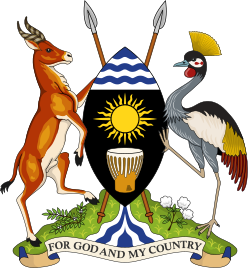Joyce Kakuramatsi Kikafunda | |
|---|---|
| Ugandan High Commissioner to the United Kingdom | |
| Assumed office 12 July 2013 | |
| President | Yoweri Museveni |
| Preceded by | Joan Kakima Nyakatuura Rwabyomere |
| Personal details | |
| Nationality | Ugandan |
| Profession | Diplomat |
| Website | www.ugandahighcommission.co.uk |
 |
|---|
Joyce Kakuramatsi Kikafunda is a Ugandan diplomat and academic who has served as High Commissioner of Uganda to the United Kingdom since 2013. [1] A professor of agriculture and food science at Makerere University, she has been involved with projects to eradicate poverty and reduce childhood malnutrition. [2] She was also a member of the Board of Trustees of the International Rice Research Institute from 2010 to 2015.
[3] At the age of 60 year she was blessed with her first child and at the age of 63 she was blessed with quadruplets [4] and on 23 August 2024 she will be launching her fourth book titled," Triumph Over Adversity-My Extraordinary Life's Journey." at Kampala Serena Hotel.